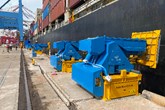Port of Rotterdam: decline in dry bulk throughput
Published by Alfred Hamer,
Editorial Assistant
Dry Bulk,
The port of Rotterdam has announced its figures for 3Q24, the figures for dry bulk are as follows. Dry bulk throughput declined by 0.9% in the first three months of 2024, compared to 2023. On the other hand, iron ore and scrap throughput (11.1%) and other dry bulk (20%) increased. The falling price of iron ore caused by the collapse of Chinese steel production is driving European steel mills to purchase iron ore, in spite of a modest demand for steel in Europe.

Coal throughput fell further in 3Q24 by 26.6% compared to the first nine months of 2023, when throughput also dropped by 17%. Thermal coal throughput saw the largest decline. Coal-fired power plants are increasingly losing ground as a source of power. In the first nine months of this year, coal-fired power plants in the Netherlands and Germany accounted for 6% and 20% of the electricity mix, respectively. Renewables represented a 58% share in the Dutch electricity mix and a 59% share in the German electricity mix.
The throughput of agribulk increased by 2.0% after correction. Soybean supply fell due to higher soybean prices as a result of a poor harvest and rising demand from China. The supply of maize from Ukraine (via Romania) has once again increased, after it fell significantly in 2023 due to the war in Ukraine. Maize is used as feed stock for bioethanol production, among other things. The throughput of other dry bulk increased by 20% after correction due to higher throughput on the buoys and dolphins, mainly of stones. The throughput of raw materials also increased at various stevedores. Although energy-intensive industries, in particular, are still struggling, stocks are slowly being replenished.
Read the article online at: https://www.drybulkmagazine.com/ports-terminals/24102024/port-of-rotterdam-decline-in-dry-bulk-throughput/
You might also like
Releasing The Line
Nick Labrosse, Trelleborg Marine & Infrastructure, discusses how automated mooring and docking systems unlock efficiency and emissions gains in dry bulk terminals.

